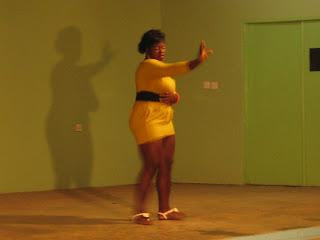 Heading for the Accra Mall , the flashy vanity project of John Kuffour, one of Ghana’s former presidents, Hannah and I decide to travel by tro tro – the cranky old minibuses that serve as Accra’s informal bus network.
Heading for the Accra Mall , the flashy vanity project of John Kuffour, one of Ghana’s former presidents, Hannah and I decide to travel by tro tro – the cranky old minibuses that serve as Accra’s informal bus network. The key to hailing a tro tro is to recognise the hand gestures made by the driver’s mate. Hand rotating in a circle means ‘Nkrumah Circle’, a point in the air means ‘Accra’ and the city circle, and three fingers pointing upwards means ‘37’. At first we were bemused, especially as most seemed to fly past. A fellow passenger helped us out, and hailed the next one passing. Apparently you have to shout and step out in front to show you want to get on.
Tro tros are hot, cramped, uncomfortable and invariably decrepit, and the random bits of rusty metal sticking out easily rip clothes (three dresses and counting for Hannah so far), but they are fun. Hawkers come up to the window at traffic lights, selling fried plantain and sachets of water, and the speed at which they dodge traffic beats any fairground ride for thrills. Shaken but happy, we arrived at ‘37’ to change for
 the service to Accra mall.
the service to Accra mall.The buses only leave when full*, so we enjoyed the buzz of the informal market that surrounds the waiting vehicles. We bought fresh coconuts – deliciously refreshing and another unmissable Ghanaian experience – and took our seats while hawkers offered an amazing array of goods. Worm tablets (complete with graphic pictures), boiled eggs, handkerchiefs, papaya, meat pies, maps of Ghana, plantain, self-help books … you may be bounced about, but you won’t go hungry or thirsty (or get sweaty or wormy) on a tro tro.
* A Cameroonian friend visiting the UK got a shock when his train to Sheffield left on time, despite not being full. "The trains, they all leave when they say they will. Amazing!"

















